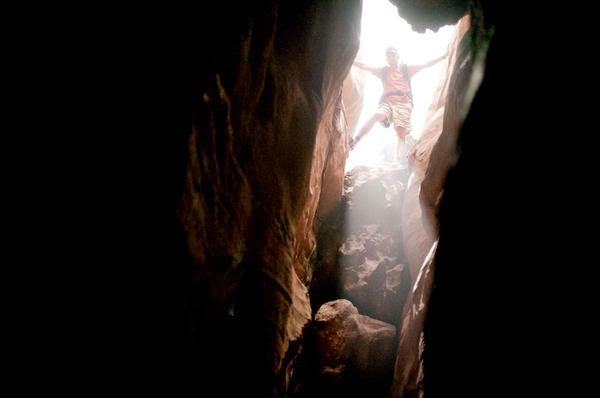127 Hours (2010)
Directed by Danny Boyle
Written by Danny Boyle and Simon Beaufoy (based on the book by Aron Ralston)
While I'm not totally in love with all his work, I'm a huge fan of Danny Boyle as a person and artist. In countless interviews he comes across as one of the most positive and forward thinking filmmakers working today. His enthusiasm for his work and life is contagious, and I'm often left feeling giddy after listening to him. If there is one common theme in most of Boyle's work, it is the triumph of regular people over extreme adversity. If that's true, then 127 Hours is the pentultimate example in a varied career that ranges from the post-apocalyptic horror of 28 Days Later to the morality play of Millions. Each of his unique films are linked by this one common element, but 127 Hours is the one that shouts it loudest and clearest.
Based on a true story, 127 Hours chronicles the frightening yet uplifting story of Aron Ralston, an adventurous but self-centered canyoneer who was trapped in a canyon for over five days when his arm became lodged between a rock wall and a fallen boulder. To pass time and spare his sanity, Aron videotapes messages to his friends and family while attempting formerly simple, but now challenging tasks with the use of only one arm. As he exhausts himself with futile efforts, he realizes with horror that there's only one way to get free. Ralston narrowly escapes starvation and the elements by amputating his right arm.
Boyle's challenge was to recreate the event in what amounts to 90 minutes of one actor standing in the same narrow space for the duration of the film. Luckily, he cleverly keeps things moving in ways that only Boyle can, with stunning photography, moving performances, and the ability to experiment to enhance the film experience. As with his other films, there is truly a feeling of being transported to this particular place at this particular time, suffering along with our hero. We are aware of his physical body, and at the same time, allowed into his wandering and fragmenting mind.
Despite some major limitations, Boyle keeps things interesting by interspersing moments of hallucinations, dreams, and other filmic embodiments of the inner turmoil within Aron's mind. He is slowly losing grasp, and in his lucid moments, feels great regret for some decisions he's made in his life. He relives key moments in which taking a different path may have led him to a better place. Here, Boyle flirts a little with the idea of fate, whether we are at the mercy of our own personal choices, or merely the influence of outside forces. Ultimately, Aron figures out that he's in control of his own destiny and must face the fact that no one, not a rescue team or a god, is going to save him.
Perhaps the biggest reason for success is found in the casting of James Franco who was the perfect choice to play Aron. The underrated actor is certainly up to the task. Appearing in virtually every scene, he commands your attention and brings real pathos to the role. Franco has a charisma that was evident from his beginnings as bad boy Daniel Desario on Freaks and Geeks, but more fully utilized here in what will most likely be an award-winning role. Every grimace of pain, tear of anquish, and cry of joy feels genuine. It's evident that Franco spent a lot of time getting in the right frame of mind by conversing with the real Ralston, as well as reaching within himself to bring out raw feelings.
You probably want to know about the amputation scene: I will let you know that the amputation scene is every bit excruciating as you might imagine. The special effects, brought to us by Tony Gardner at Alterian Studios, have been exhaustively rendered. It almost looks like one is watching a documentary on rudimentary surgery. Another reason why the scene is so harrowing is the addition of effective sound design that penetrates in such a way as to cause additional stress in the viewer. As if we weren't already on edge.
One final note: There's a bit of conflict between a key realization in the film and the theme of individual triumph. I believe one of the overall messages of the film is that it's ok to ask for help. However, it is solely by individual effort that Aron gets out of his terrifying situation. Perhaps Boyle was exorcising his own demons and owning up to past mistakes. Maybe asking for help before you get stuck in the canyon is the overarching theme. In that regard, the film may actually be about trusting in others whether it's making a movie, exploring canyons, or solving a family problem. That would reconcile the two, in my opinion.
127 Hours is certainly one of the best films of the year and more than worth your time in the theater to fully experience the sheer power and beauty. Go see it if you have the chance!
127 Hours Trailer





No comments:
Post a Comment